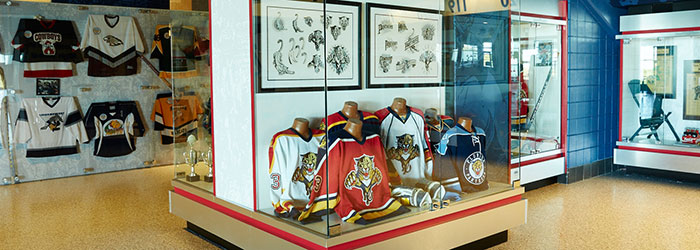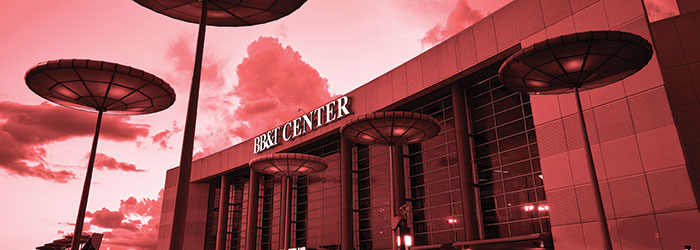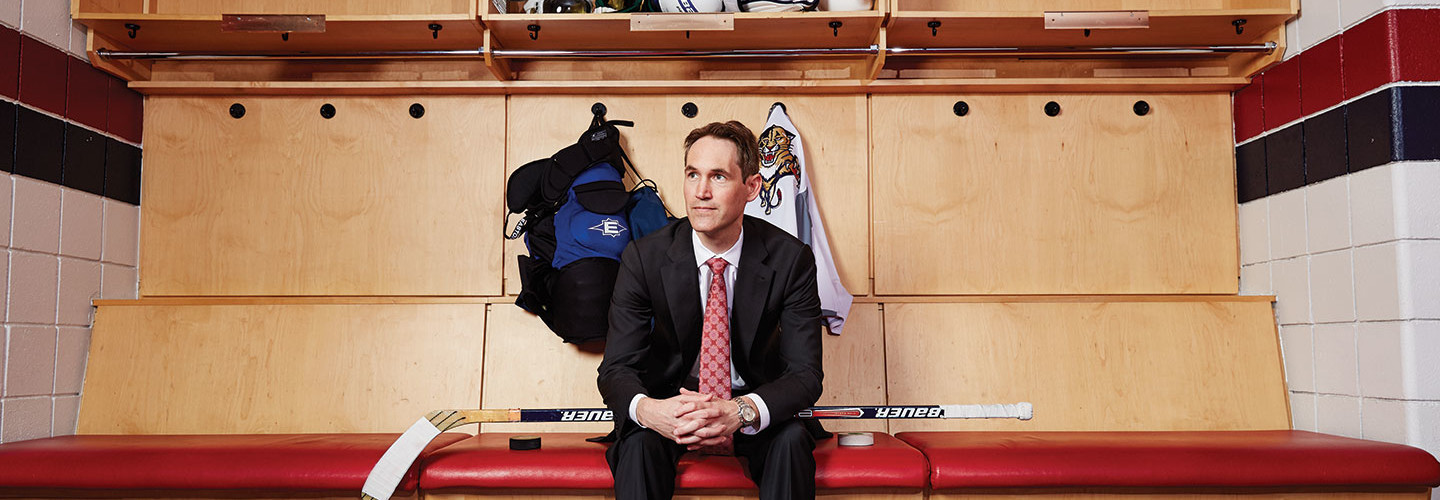Florida Panthers Score on Technology Rebound
The Florida Panthers had enough skating on thin ice with the team’s old phone system.
Last year, the hockey team’s 16-year-old PBX suffered from service issues with increasing frequency. Typically, downtime was short and minor, but nonetheless frustrating to employees when, for instance, a portion of the phones at the hockey team’s BB&T Center headquarters would suddenly lose its dial tone. Last summer, a large electrical storm knocked out the phone system entirely. The IT team was able to acquire spare parts for the old system, which the manufacturer had stopped making in 2001, but it was clear that time was growing shorter. Additionally, the antiquated system did not offer simple modern-day amenities such as caller ID.
When the storm knocked out the system, it made the purchase an easy decision. “We had to source parts from liquidators to get it back online,” says John Spade, who joined the Panthers in 2014 as vice president of IT. “There would be only so many more times that was achievable, so it was time to upgrade.” The hockey franchise purchased the Cisco Business Edition 6000, an all-in-one Voice over IP (VoIP) solution that includes Cisco Unified Communications Manager for call processing and Cisco Unity Connection for voice messaging running on Cisco UCS servers. The team also bought about 200 new Cisco IP phones.
The Right Call
Cisco’s new communications infrastructure, aimed at small and medium-sized businesses with 25 to 1,000 employees, provides executives, office employees, front office staff and coaches the reliability, uptime and features they need to communicate effectively, Spade says.
Phone service is a necessity for almost any business, and that’s no different for the Florida Panthers: During hockey season, fans call every day with questions, while departments such as group sales and corporate partnerships rely on phones as part of their daily operations.
The team’s parent company, Sunrise Sports and Entertainment, also manages the BB&T Center, which regularly hosts concerts, monster truck rallies and other family-oriented events.
The new phone system not only improves worker productivity and customer service, but also provides reliable communication for league officials during hockey games, and for entertainers and their staff before and after shows. For Spade’s three-person IT team, the new Cisco UC phone system is easier to manage. The team can deploy new phone lines quickly when needed, ultimately saving time and money.
“It’s been working perfectly,” he says. “No regular maintenance has been required.”
Back to Full Strength
When Spade started managing the Panthers’ IT operations in April 2014, one of the first things he did was explore new telephony options.
The IT department first upgraded some of the arena’s wiring to support the new phone system. After the cabling, the team installed the Cisco Business Edition 6000 with redundancy in mind, deploying two Cisco UCS C220 servers and installing Cisco’s voice applications on each. They also installed two Cisco 2900 Series Integrated Services Routers, which link the phone system to the phone service provider.
Joel Suárez, the CDW UC solution architect who designed the system, says that redundancy is important: If one server or router goes down, the other will ensure the phone service stays up and running.
“It provides high availability end to end,” Suárez says. The Cisco 7800 Series IP phones were easy to deploy, Spade says. The new switches support Power over Ethernet, allowing the Panthers’ IT team to use an Ethernet connection to power the phones.

Better Scoring Chance
Many take phone features such as caller ID or a mute button for granted today, but that wasn’t the case for employees, who long went without the ability to view their call history, for instance, or enjoy other standard phone features. Adelyn Biedenbach, the Panthers’ coordinator of digital media and communications, fields a lot of press calls on deadline, so the ability to see missed calls was hugely important to her, she says. Her favorite new feature is unified messaging, which allows her to check voicemail from her smartphone’s email inbox.
“When we get phone calls about a press conference, an announcement or questions about practice times, it just makes it a lot easier to manage those calls and answer in the most timely manner possible,” Biedenbach says. Delwin Liranzo, the team’s group events manager, says he appreciates the new system’s user-friendliness. He sometimes makes 80 to 100 calls a day as he sells group packages, so the ease of use allows him to work faster.
“Before, everyone’s phones were different. A button on one phone meant something else on another, so when I was starting out, I didn’t know how to transfer or put someone on hold because it wasn’t the same for every phone,” he says. “Now it’s so much easier.”
When he’s on speakerphone, Liranzo says the sound quality also seems much improved: “It’s night-and-day better.”
I.T. Gets an Assist
The new Cisco phone system is easier for IT staff to manage and maintain. Spade can use web-based software to configure and manage the system, adding new users and phone lines as needed.
“Because it’s network-based, we can add new phone lines or move phones without having to physically rewire,” Spade says.
That makes a huge difference when the arena hosts concerts or special events and additional phones are needed: Perhaps a musician wants a phone line in the dressing rooms, or during college basketball season, teams may request phones set up courtside.
“It used to be challenging having to wire each line individually and connect it. Now we just plug it into the network,” Spade says.
Last June, the arena hosted the hockey league’s amateur draft, featuring 30 teams, 1,500 prospects and about 500 media members. Spade’s team used a Session Initiation Protocol trunk provider to temporarily add several hundred extra phone lines.
“We can add as many lines as we have Internet bandwidth for. And phone calls don’t take much bandwidth, so as far as we’re concerned, it’s infinite,” he says.
Moving forward, Spade says he will consider adding call center software if employees need it. He’s also testing Cisco Jabber, a collaboration application for instant messaging and desktop calls.
Changing on the Fly
Now that a Cisco Systems unified communications phone system upgrade is complete, the Florida Panthers plan to beef up Wi-Fi access.
The IT department previously installed 25 Cisco Wi-Fi access points for employees, media, players and coaches as well as the entertainers who perform at the arena. This year, the team will quadruple the number of APs for the same set of users, says John Spade, the team’s vice president of IT. The team is standardizing on new Cisco Aironet access points that support the latest 802.11ac standard.
“This supplements what we already have. We need to provide better overall coverage,” he says.
A network equipment upgrade two years ago provided all of the bandwidth required to boost communications inside the arena, first with the phone system and now with Wi-Fi, Spade says. In 2013, the team deployed a Cisco Catalyst 4500 Series switch at the core, which provides 10-gigabit-per-second speeds. The team also installed new Cisco Catalyst 3750 switches throughout the arena’s wiring closets, offering gigabit speeds to desktops.

Big League Communications
Open-air stadiums, indoor arenas and other large venues are upgrading IT infrastructure to better connect with fans and attract the hottest events.
Under the sun: University of Phoenix Stadium, home to the Arizona Cardinals, upgraded to Cisco Connected Stadium, which included Wi-Fi, security and unified communications systems.
At the racetrack: The International Speedway Corp., which manages NASCAR facilities, beefed up its network with Cisco gear, a modernized data center and expanded telephony.
In the Dome: The Georgia Dome, home of the Atlanta Falcons, blanketed the stadium with a high-density wireless network so patrons can stay connected with their mobile devices.
Big in Texas: The Houston Texans’ IT team upgraded their data center and network at NRG Stadium. They also installed a new Cisco VoIP system and call center services.








